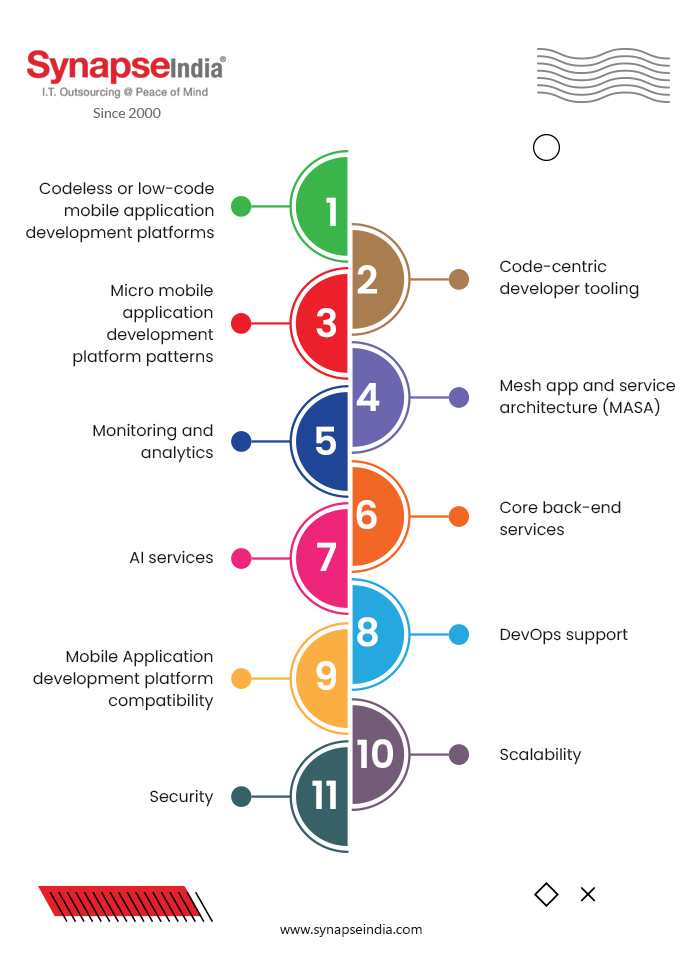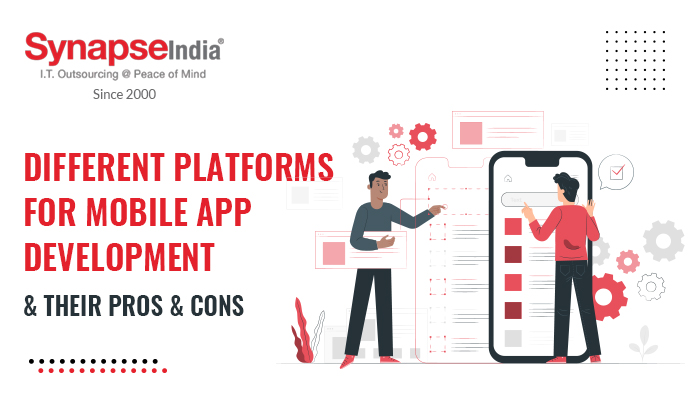Different Platforms for Mobile App Development & Their Pros & Cons
 20 Jul 2022
20 Jul 2022
Mobile application development has now become easy, because of the different platforms available for mobile app development. These development platforms have different features which help developers in the development process.
The mobile application development platform market has become a new big thing in the tech world and is expected to generate $14 billion by 2023. The demand for mobile app platforms is increasing steadily. These platforms have gained popularity because of the functionality they offer to the developers and entrepreneurs; to assemble various elements and features into an app.
Developing applications for mobile is a complicated and time-consuming process since it includes going through difficult programming phases and user interface (UI) design work. But you can choose to bypass those processes easily because these app platforms will provide you with ample features to choose from. These app development platforms are like an all-in-one environment of the tools utilizing which you can create, optimize, debug, deploy, test, and maintain mobile applications.
Those mobile app development platforms offer different features to the developer that can be used to develop apps as per your business requirement. But there are times when the need arises to merge multiple platforms for front-end, back-end development, or security add-on layers, notifications, data storage, etc.

Microsoft Xamarin
With time Xamarin has become developers and users favorite because of its easy-to-use functionality. Moreover, the platform is suitable for Android, iOS, and Windows devices, and also offers cross-platform mobile application development services.
Pros
- One single code for an app can be used across multiple platforms (such as Android & iOS).
- Xamarin uses tools to test for problems. With the help of the Test Cloud function, developers can test more than 2,000 devices and can check the highest possible quality of the app.
- As part of Microsofts Visual Studio, Xamarins libraries and tools are free and open source.
- Since multiple platforms use one programming language it is easy and time-saving to update all the versions of an app at one time.
Cons
- The community of the Xamarin platform is limited because it's new in the market. Companies may find it difficult to look for an experienced Xamarin developer, while developers may have trouble finding help when they face challenges.
- The platform has fewer resources to manage its bugs.
- Xamarin library is extensive which means complex projects may require additional native coding.
Flutter
This Google open-source SDK is known for its modern appeal. It has achieved global recognition for its versatility in user interface construction and characteristics such as developing innovative and seamless animation. To create the most powerful applications, this mobile app platform uses dart language, which makes Flutter a great choice for developing 2D games or clothing store apps for iOS or Android.
Pros
- It is easy to fix bugs because it allows instant changes in the app.
- Flutter-based apps are known for their sleek performance
- Testing and quality assurance becomes easy and less time-consuming because of the single code base.
- Building an app in Flutter is fast and efficient.
Cons
- Apps developed under Flutter are weighty ones.
- The resource base of Flutter is limited, which means, your developers will need to write a few resources from scratch.
- It is essential to learn Dart if you want to work with Flutter.
Adobe PhoneGap
The mobile application development platform list is never-ending but if you are looking for something that can fit aptly into your future growth strategy then this platform is specifically designed for you. The open-source free framework of PhoneGap makes it easy for organizations to execute their expansion strategy. It is also possible to extend usage on the app by using plug-in architecture, thus becoming more useful for phone users.
Pros
- PhoneGap cross-platform ability makes it developers favorite. They can create a single app and can deploy it on all mobile platforms.
- The framework allows uniformity in cross-platform mobile app development.
- Working knowledge of JavaScript, CSS3, and HTML5 is enough for developers to build a cross-platform application.
- The PhoneGap native-app container, PhoneGap Build supports several PhoneGap or Cordova plugins which helps in extending the native functionalities while developing apps.
Cons
- Since plugins with hooks are not supported by PhoneGap Builds so at times it can act as an obstacle to the functionality.
- Since it is essential to download iOS SDKs while developing an iOS program, hence, Mac becomes essential for PhoneGap app developers.
- PG, with all its complexity of plugins and APIs, may fail to deliver while developing a gaming app.
Sencha
It's anything but a major surprise that Sencha has become a part of our list of the best mobile app development platforms. The platform is already famous with its strong data pack and rich UI resources (over 115 parts), reasonable for those searching for data-intensive cross-platform applications. The application is composed by the HTML5 code base and can be introduced on various operating systems, including Android, iOS, Blackberry, Windows, Kindle, and Tizen.
Pros
- Sencha offers rich UI components which cover all major functionalities.
- Code can be translated with the help of the mobile app development tool
- Rationalized configuration system
Cons
- The platform is expensive.
Appcelerator
One of the best mobile app development platforms is Appcelerator. It performs an excellent job when it comes to adapting the high-performance mobile app model for enterprise users. Titanium SDK development framework, shortens the time to develop a mobile application for operating systems like iOS and Android. It offers enough cloud storage that allows integration with third-party libraries and supports businesses in multi-region global deployments.
Pros
- Appcelerator's Titanium speeds up the application development process because it allows the development in a very flexible way.
- Titanium indulges in the development process when the app interacts with a web service since the application itself is developed by using web technologies.
Cons
- Appcelerator offers users Store Kit which is a module to enable In-App Purchase to Apples App Store, but its nothing more than a pain. Buggy, poorly documented and it seems to work only partially.
Final Thoughts
Now, you know the best platforms for mobile app development along with their pros and cons. You can select the platform as per the need of your business and project.
But if you have any doubt regarding the mobile app development platforms then we are here to guide you.
Surbhi Vats
Surbhi Vats is an experienced IT blogger, her blogs has been published on sites like Medium. Her keen endeavors to know and understand current industry trends has helped users to comprehend regular uproars happening in the industry. Also, organizations around the globe recognize her knowledge-oriented blogs. She is a tech expert who is capable of engendering business growth.
 20 Jul 2022
20 Jul 2022

.jpg)
 19 Feb 2025
19 Feb 2025
